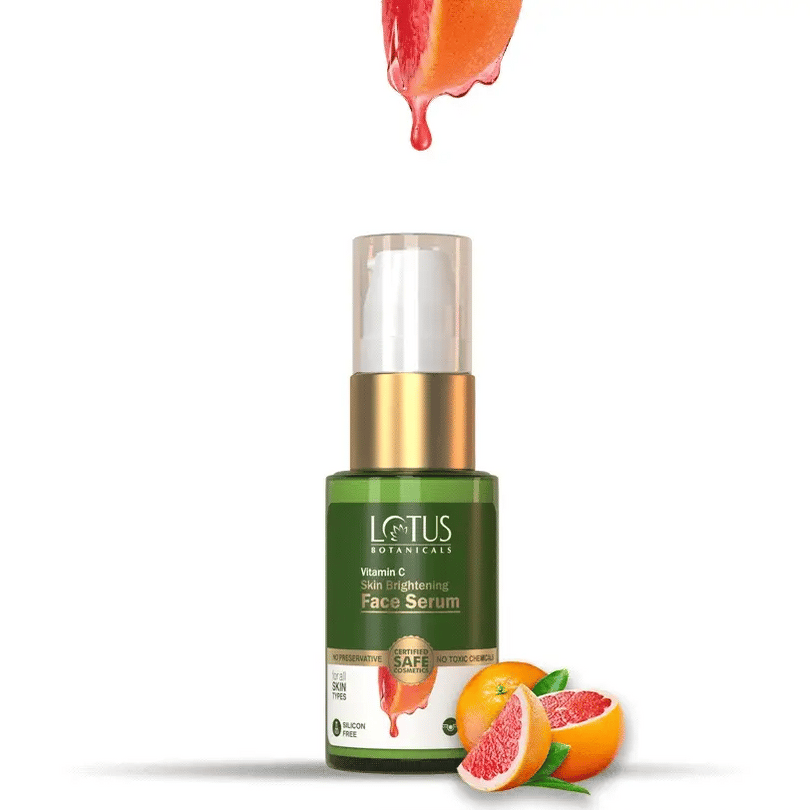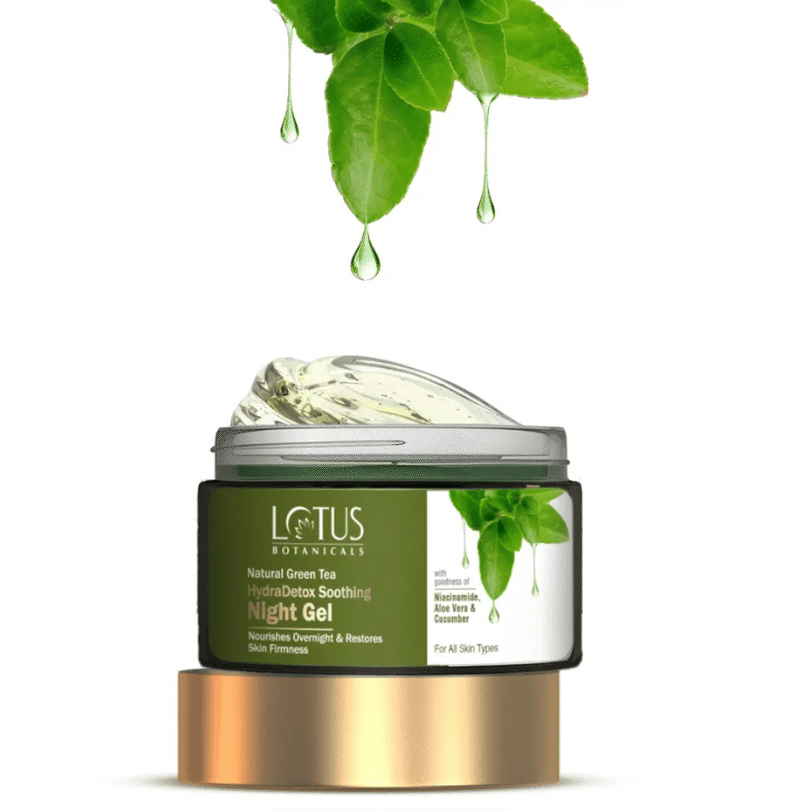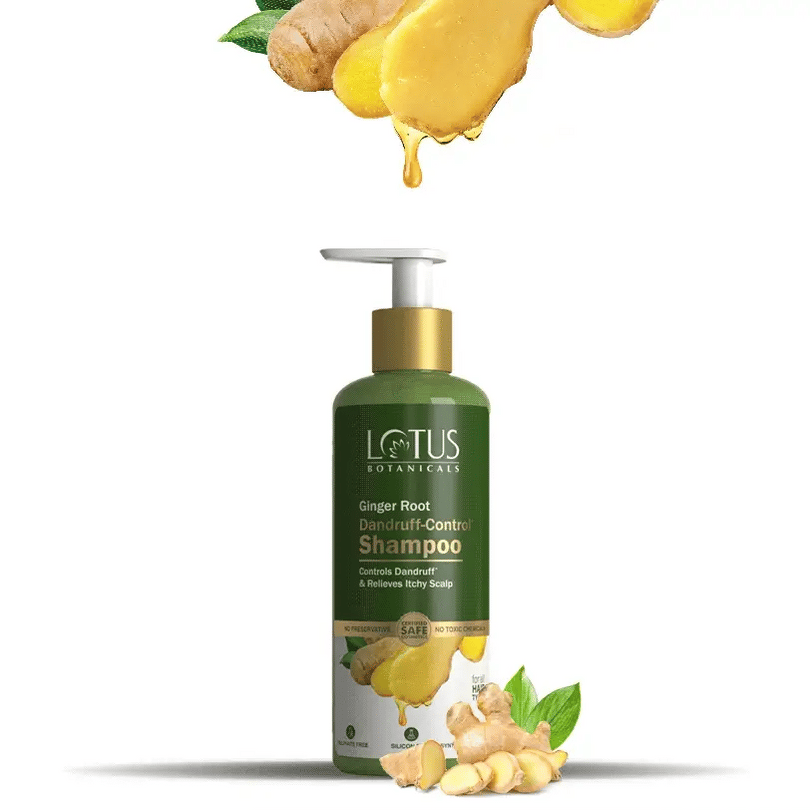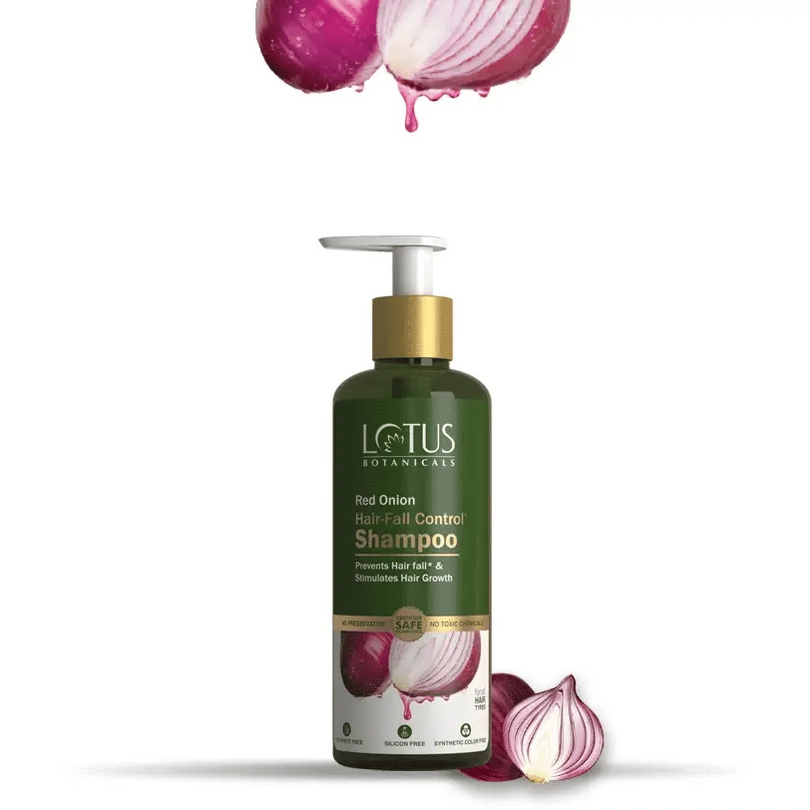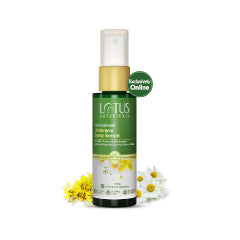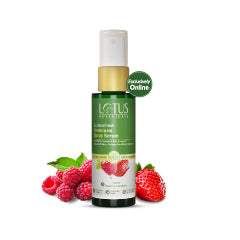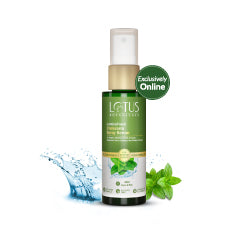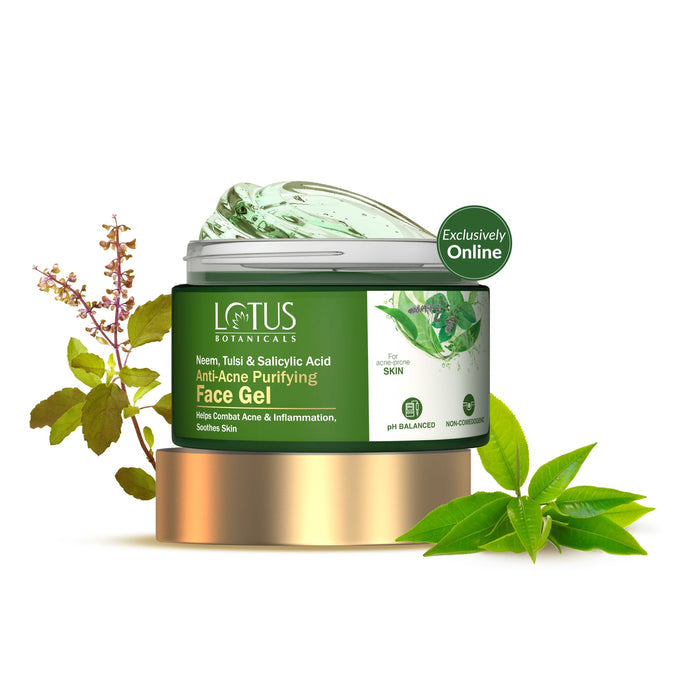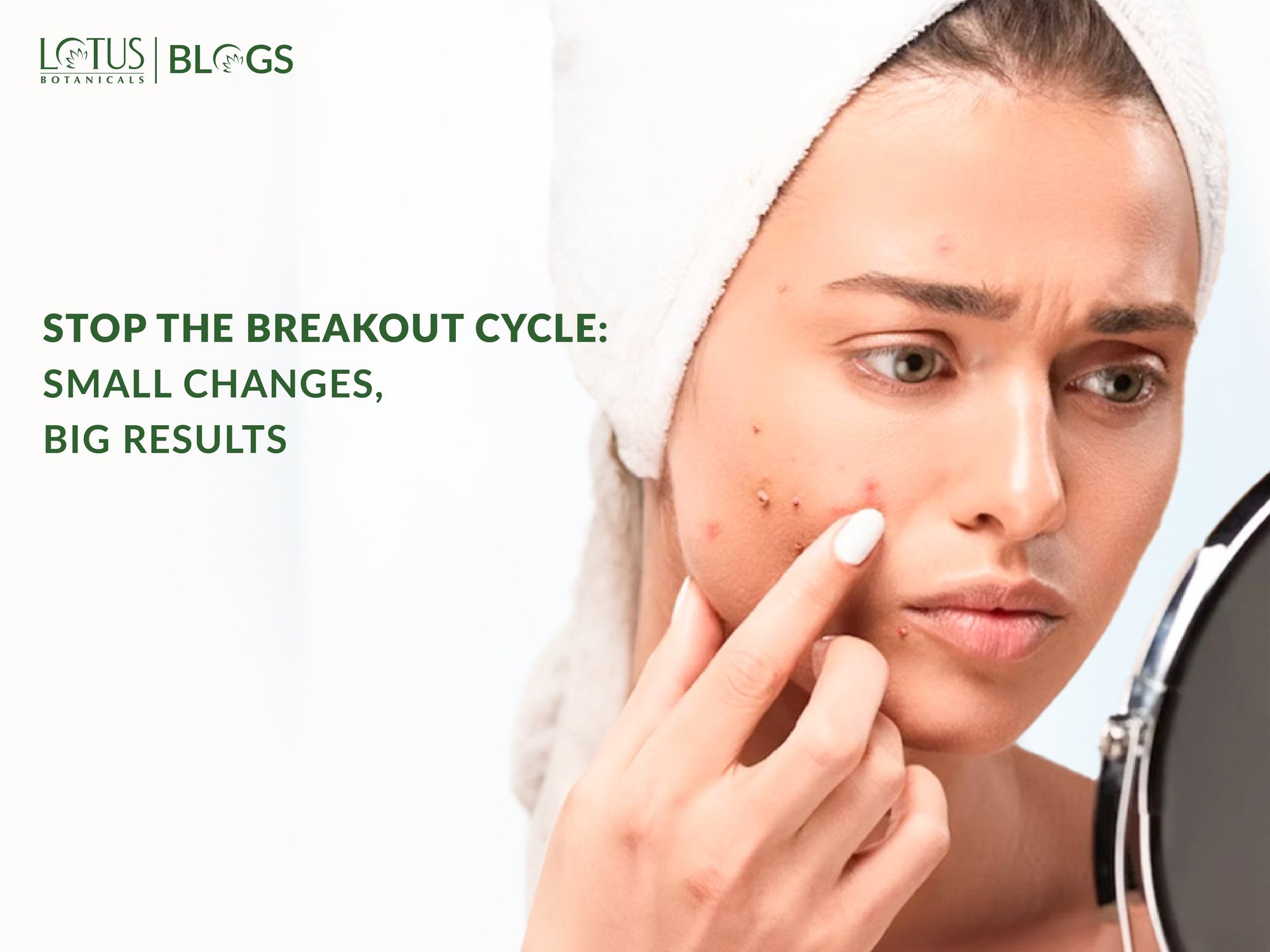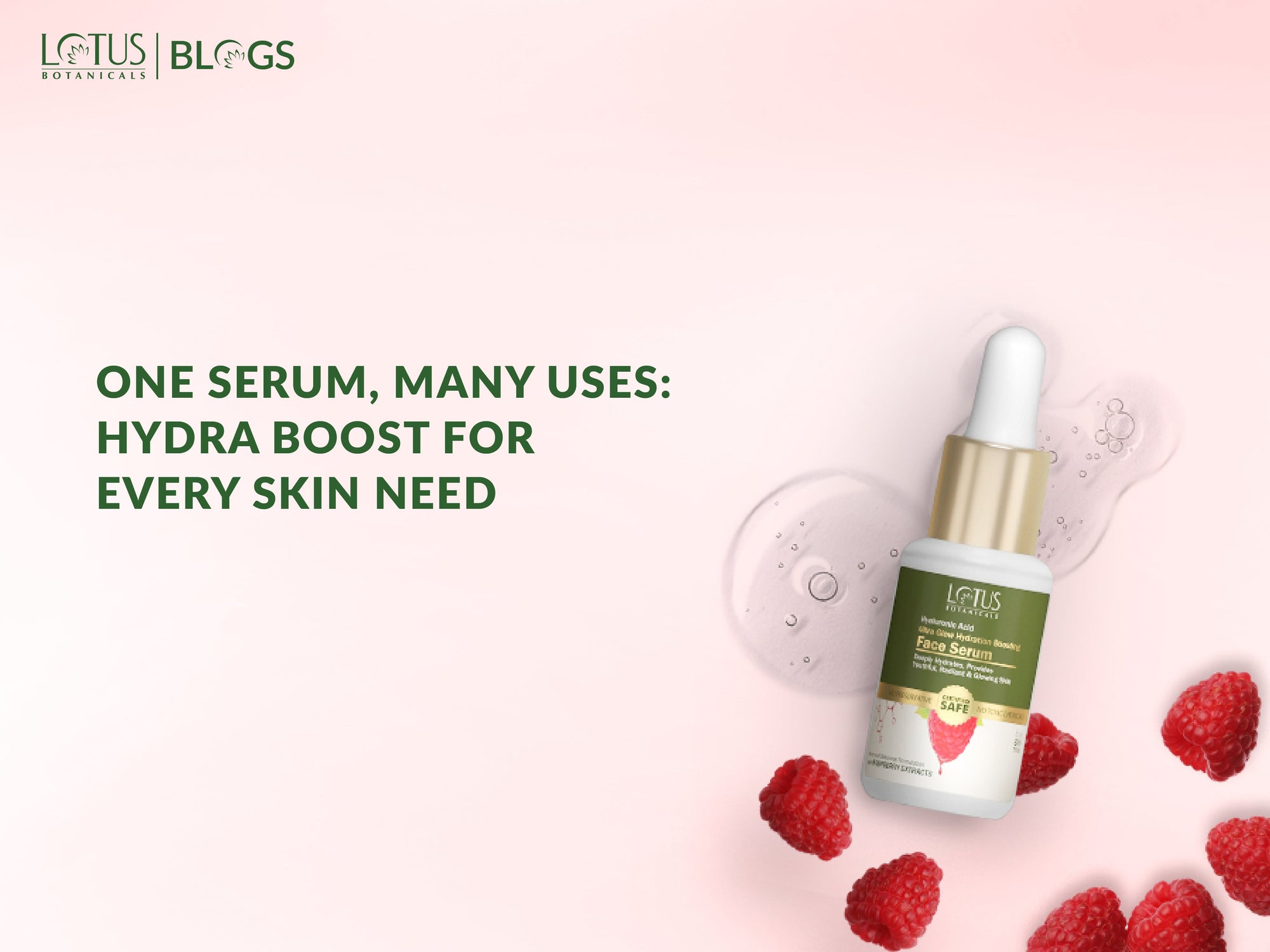
Highlights
-
Why Vitamin C Is a Must-Have for Your Skin in India
-
How Vitamin C Works to Protect Your Skin from Indian Pollution
-
What Makes Vitamin C Serum Different from Just Eating Oranges?
-
Brighten Up: How Vitamin C Serum Fades Dark Spots and Pigmentation
-
Why Does Vitamin C Serum Help With Uneven Skin Tone?
-
How to Use Vitamin C Serum for Face to Target Stubborn Marks
-
Your Go-To for Trusted Skincare Solutions: Lotus Botanicals
-
Your Shield Against Sun Damage: Vitamin C’s Secret Power
-
Say Goodbye to Dullness: Get That Healthy Glow with Vitamin C
-
Firm Up: Can Vitamin C Serum Really Reduce Fine Lines?
Why Vitamin C Is a Must-Have for Your Skin in India
Ever wondered why everyone’s talking about vitamin C in skincare lately? If you live in India, this isn’t just a trend it’s almost a necessity. With all the pollution, harsh sunlight, and dust we deal with every day, your skin needs some extra protection. That’s where vitamin C steps in.
Let’s break down exactly how vitamin C helps your skin handle the unique challenges of Indian weather and lifestyle.
How Vitamin C Works to Protect Your Skin from Indian Pollution
Here’s the thing air pollution in Indian cities is no joke. The tiny particles from traffic, factories, and even festivals can settle on your skin. This leads to dullness, breakouts, and sometimes even early signs of aging.

- Vitamin C acts as an antioxidant. It fights off damage caused by free radicals found in polluted air.
- It helps reduce inflammation and soothes redness or irritation from daily exposure.
- Your skin looks brighter and feels healthier because vitamin C supports your natural barrier.
“Studies show vitamin C can neutralize up to 80% of environmental damage when used daily.” — Dermatologist Dr. Meena Gupta
Think about stepping out for a quick chai run or a walk to the metro station. Even then, your skin faces pollution. Applying a good vitamin C serum in the morning is like putting up a shield.
What Makes Vitamin C Serum Different from Just Eating Oranges?
You might be thinking can’t I just eat more oranges? While eating fruits is great for your health, it doesn’t give your skin the same boost as a topical serum.
|
Eating Oranges |
Using Vitamin C Serum |
|
Supports overall immunity |
Targets skin directly |
|
Slow absorption |
Fast absorption through skin layers |
|
No direct impact on dark spots or pigmentation |
Reduces dark spots and boosts glow quickly |
- A serum delivers concentrated vitamin C right where it’s needed most your skin’s surface.
- You get quicker results like reduced pigmentation and brighter complexion.
- No sticky feeling or orange peel mess just smooth application.
If you want to see what other ingredients work wonders along with vitamin C, have a look at AHA/BHA/PHA FAQs. Mixing the right products can make all the difference.
Bottom line: Don’t just rely on diet if you want visible changes. A good vitamin C serum is a real game plan for glowing, protected skin especially with India’s environment.
Q: Can I use vitamin C serum every day?
A: Yes! Using it daily after cleansing gives your skin strong protection and brightens your complexion over time.
Q: Is vitamin C good for all skin types?
A: Absolutely. It works well for oily, dry, combination, or sensitive skin. Just start with a small amount to test tolerance.
Q: Where can I find quality vitamin C skincare?
A: Check out trusted brands like Lotus Botanicals’ Vitamin C range.
Brighten Up: How Vitamin C Serum Fades Dark Spots and Pigmentation
Ever look in the mirror and wonder if those dark spots will ever go away? You’re not alone. Lots of us struggle with uneven skin tone, leftover acne marks, or sun spots. Here’s the thing Vitamin C serum is one of the best tools you can use to tackle these issues. But how does it actually work? And are you using it the right way for real results?

Why Does Vitamin C Serum Help With Uneven Skin Tone?
You might be asking, “What’s so special about Vitamin C for skin?” It’s not just hype. Here’s why:
- Blocks Melanin Production: Vitamin C interrupts the process that causes excess melanin (the pigment that makes dark spots). This helps fade old spots and prevents new ones from forming.
- Brightens Your Complexion: Dull, patchy skin? Vitamin C helps your skin look more even and radiant.
- Boosts Collagen: Collagen keeps your skin firm and smooth. Vitamin C gives collagen production a nudge, which can help soften marks left by breakouts or sun damage.
- Fights Free Radicals: Pollution and UV rays cause skin damage. Vitamin C acts as a shield, protecting your skin from these daily stressors.
“Studies show that regular use of topical Vitamin C can reduce pigmentation in as little as 12 weeks.” – Dermatology Research Journal
Ever noticed how your skin looks brighter after a holiday when you eat lots of oranges? That’s Vitamin C at work from the inside. Now imagine what happens when you put it directly on your face every day. That’s the power of a good serum.
If you want to learn more about ingredients that help with pigmentation, check out our article on Sandalwood Powder for Healing Skin Problems.
How to Use Vitamin C Serum for Face to Target Stubborn Marks

You’ve got your bottle now what? Here’s what works best for most people:
- Cleanse First: Wash your face with a gentle cleanser. Don’t skip this step clean skin helps your serum work better.
- Apply Serum: Put a few drops of vitamin C serum onto your fingertips. Gently press it into your face, focusing on dark spots and pigmented areas.
- Let It Absorb: Wait one or two minutes before moving on. Let your skin drink it in!
- Add Moisturizer: Follow up with your favorite moisturizer to lock in all the goodness.
- Sunscreen Is a Must: Never skip sunscreen in the morning! Vitamin C makes your skin more sensitive to sunlight, so SPF is non-negotiable. We recommend trying a product like our own Vitamin C Sunscreen.
The truth is, results don’t happen overnight. Most people start seeing brighter, more even-toned skin after four to eight weeks of daily use. If you’re curious about what else might be causing stubborn marks or why serums sometimes stop working, see our article on 7 Signs Your Serum Isn’t Working Anymore.
|
Step |
When To Use |
Extra Tips |
|
Cleansing |
Morning & Night |
Avoid harsh scrubs |
|
Vitamin C Serum |
After Cleansing |
Palm-warm before applying |
|
After Serum |
Choose lightweight for oily skin |
|
|
Sunscreen (AM) |
Final AM Step |
Reapply if outdoors often |
- If you have sensitive skin, start with every other day use.
- Avoid mixing vitamin C with strong acids (like AHA/BHA) at the same time unless directed by a pro.
- If you want more info on acids in skincare, here’s an easy guide: AHA/BHA/ PHA: Frequently Asked Questions.
Your Go-To for Trusted Skincare Solutions: Lotus Botanicals
If you're searching for effective vitamin C serums or just want to up your skincare game, check out the expert-backed products at Lotus Botanicals. You'll find solutions tailored for every skin need whether it's brightening, hydration, or sun protection.
Q: Can I use vitamin C serum every day?
A: Yes! Most people get the best results with daily use just remember to follow up with sunscreen in the morning.
Q: How long does it take to see results?
A: You’ll usually notice brighter, smoother skin after four to eight weeks of consistent use. Patience pays off!
Q: Can I layer vitamin C with other serums?
A: Yes, but be careful mixing with strong acids or retinol at the same time. Try alternating days or ask a dermatologist if unsure.
Your Shield Against Sun Damage: Vitamin C’s Secret Power
Ever wondered why your skin still gets dull or develops spots, even when you’re religious about sunscreen? Here’s the thing UV rays are sneaky. They can trigger changes deep in your skin, leading to damage over time. That’s where vitamin C steps in as your secret weapon. Let’s break down how this antioxidant works, and why teaming it up with sunscreen could be the best move for your skin.
How Vitamin C Serum Works on Skin to Fight UV Exposure
So, what’s so special about vitamin C? First off, it’s a powerful antioxidant. That means it helps neutralize those pesky free radicals created by sun exposure. Free radicals are unstable molecules that attack your healthy skin cells, causing things like:
- Premature wrinkles
- Uneven skin tone and dark spots
- Loss of firmness
“Studies show that topical vitamin C can reduce sunburned cells by up to 60% and decrease long-term skin damage.”
— Dermatology Research, 2023
But wait, there’s more, Unlike sunscreen which blocks or absorbs UV rays vitamin C works beneath the surface. Here’s how:
- Fights Free Radicals: Stops oxidative stress before it ages your skin.
- Boosts Collagen: Helps repair and rebuild, so your skin stays firm.
- Brightens Up: Fades dark spots caused by the sun.
Imagine you spent a day outdoors and forgot to reapply sunscreen. Vitamin C serum won’t undo a sunburn, but using it daily can help minimize the invisible damage that builds up over time.
For an extra boost of brightness and protection, check out this guide on Vitamin C Skin Brightening Day Creme.
Pairing Vitamin C with Sunscreen: Is It Really Better Together?
You might ask do you really need both? The truth is, yes! Think of vitamin C and sunscreen as the dream team for your skin. Here’s why:
|
Vitamin C Serum |
Sunscreen |
Together |
|
Fights free radicals |
Blocks UV rays |
Reduces sun-induced aging & dark spots even more |
|
Brightens skin tone |
Prevents burns & immediate damage |
Keeps skin looking youthful & even-toned longer |
- Sunscreen is your first shield. It stops most UV rays from hitting your skin.
- Vitamin C is your backup. It tackles any leftover free radicals that sneak through.
Here's what works best:
- Apply vitamin C serum after cleansing in the morning.
- Follow with a broad-spectrum sunscreen (SPF 30 or higher).
- Reapply sunscreen every two hours if you're outdoors.
If you want a one-step solution, check out the Vitamin C Sunscreen. It's a great pick for busy mornings.
Your One-Stop Shop for Sun Protection: Lotus Botanicals
If you're looking for products that combine nature with science, check out Lotus Botanicals. They offer a range of vitamin C serums and sunscreens to keep your skin healthy and glowing. Curious about other skincare essentials or want some inspiration?
Q: Can I use vitamin C serum every day?
A: Yes! Daily use helps build up protection against free radical damage and keeps your skin brighter over time.
Q: Should I apply vitamin C before or after sunscreen?
A: Always use vitamin C serum first, then layer sunscreen on top for maximum effect.
Q: Will vitamin C make my skin sensitive to sunlight?
A: No, vitamin C itself doesn't make you more sensitive. In fact, it helps defend against sun-induced damage when paired with SPF.
If you want to dive deeper into skincare routines or product tips, check out these helpful reads:
Say Goodbye to Dullness: Get That Healthy Glow with Vitamin C
Ever looked in the mirror and wondered why your skin looks tired, even after a good night’s sleep? You’re not alone. Dull skin is something we all struggle with from time to time. But here’s the thing Vitamin C can truly help you wave goodbye to that dullness and welcome a healthy, radiant glow. If you’ve been curious about adding Vitamin C to your routine, you’re in the right place. Let’s break it down together.
How Vitamin C Face Wash and Serum Boost Your Skin’s Radiance
You might be asking, “Does Vitamin C really make a difference?” Absolutely! Here’s how it works:
- Brightens skin: Vitamin C helps fade dark spots and evens out your skin tone.
- Fights free radicals: It protects your skin from pollution, sun damage, and stress.
- Promotes collagen: Collagen keeps your skin firm and bouncy goodbye sagging.
- Reduces redness: If you struggle with blotchiness, Vitamin C can help calm things down.
Imagine starting your day with a gentle Vitamin C face wash. It sweeps away impurities while giving your skin a fresh boost. Follow up with a Vitamin C serum, and you’ll notice that instant glow almost like you just had a facial. Consistent use is key for real results.
“Vitamin C is one of the most researched ingredients for brightening and protecting skin,” says Dr. Rina Shah, dermatologist.
Not sure which product to pick? Look for serums with at least 10% Vitamin C. For sensitive skin, start slow maybe every other day. And if you want extra tips on picking the right serum, check out our guide on how to know if your serum is working.
|
Benefits of Using Vitamin C Face Wash vs. Serum |
||
|
Vitamin C Face Wash |
Vitamin C Serum |
|
|
Main Use |
Cleanses and refreshes |
Treats and brightens deeply |
|
How Often |
Daily (morning & night) |
Daily (usually morning) |
|
Instant Glow? |
Mild |
Noticeable over time |
|
Best For |
All skin types |
Dull, uneven skin tone |
If you’re still deciding between a wash or serum, why not use both? They work best as a team.
Simple Ways to Add Vitamin C to Your Morning Routine for Glowing Skin
You don’t need an elaborate routine to see results. Here’s what works best for most people:
- Start with a gentle cleanser: If it’s a Vitamin C face wash, even better. Try massaging it for about 30 seconds before rinsing.
- PAT—don’t rub—your face dry: This keeps irritation at bay.
- Apply a Vitamin C serum: Use just a few drops and gently press it into your skin.
- Add moisturizer: Lock in all that goodness so your skin stays soft all day.
- Sunscreen is non-negotiable: Always finish with sunscreen even indoors. Want to double up? Pick one with added Vitamin C like this popular option: (Vitamin C Sunscreen)
The truth is, consistency matters more than perfection. Even on busy mornings, just a few minutes can make all the difference.
- If you’re new to actives like Vitamin C, test on a small patch first.
- Avoid layering too many strong products at once.
- If you have questions about using acids or actives together, check our detailed FAQ on AHA/BHA/PHAs here.
Your Go-To Place for Glowing Skin: Lotus Botanicals
If you want reliable products packed with natural goodness, check out the complete range at Lotus Botanicals’ website. From serums to sunscreens and more, they’ve got everything you need for radiant skin.
Q: How soon will I see results after adding Vitamin C to my routine?
A: Most people notice brighter skin in about two weeks. For stubborn spots or uneven tone, give it four to six weeks.
Q: Can I use Vitamin C with other active ingredients?
A: Yes, but go slow! Don’t mix too many strong actives at once. For more on this topic, check our guide on using hyaluronic acid safely with other products.
Q: Is Vitamin C safe for all skin types?
A: Usually yes! Sensitive skin? Start slow and always patch test first.
Firm Up: Can Vitamin C Serum Really Reduce Fine Lines?
Have you ever stared at your reflection and wondered if there’s a way to smooth out those fine lines? You’re not alone. So many of us are searching for real, effective ways to get firmer, younger-looking skin without breaking the bank. That’s where vitamin C serum comes in. But does it really work? Let’s break it down together.
How Vitamin C Helps Boost Collagen for Firmer Skin
Here’s the thing collagen is your skin’s natural “scaffolding.” As you get older, your body makes less of it. That’s why skin starts to look thinner and those lines show up.
Vitamin C is like a personal trainer for your collagen. It helps your skin produce more of this strong protein, making your face look plumper and smoother.
- Antioxidant Power: Vitamin C fights free radicals, which break down collagen and speed up aging.
- Collagen Synthesis: It directly encourages your skin to make more collagen.
- Brighter Complexion: On top of firming, it helps fade dark spots and evens out skin tone.
“Several studies have shown that using a vitamin C serum regularly can visibly reduce fine lines and boost firmness.”
- Dermatology Research Journal
Imagine you’re using a vitamin C skin brightening day crème. With daily use, you’ll notice your skin feels stronger and looks more radiant. Plus, it layers well under sunscreen for daytime protection (check out these vitamin C sunscreens that do double duty).
|
Benefit |
How Vitamin C Helps |
|
Reduces fine lines |
Boosts new collagen production |
|
Firms loose skin |
Strengthens existing collagen fibers |
|
Evens out tone |
Lowers pigmentation from sun damage |
When Will You See Results from Vitamin C Serum for Face?
I know what you’re thinking how soon will I actually see firmer skin? Let’s set some realistic expectations.
- First Week: You might notice your skin looks brighter and feels smoother.
- After Four Weeks: Fine lines may start to soften. Skin feels firmer overall.
- Three Months: Collagen has had time to build up, so deeper lines can look less obvious.
“Most users see visible improvement in firmness and texture within one to three months of consistent vitamin C use.”
- Skincare Specialist Advice
The secret? Consistency. Apply your vitamin C serum every morning after cleansing. If you skip days or don’t use enough, results will be slower. And don’t forget sunscreen vitamin C works best when you protect your skin from the sun.
Discover More with Lotus Botanicals
If you're looking to upgrade your skincare game, check out the wide range of natural products at Lotus Botanicals. They offer everything from vitamin C serums to brightening creams and expert advice on all things beauty.
Q: Do all vitamin C serums work the same?
A: No, not all serums are created equal! Look for one with at least 10-20% vitamin C and airtight packaging for best results.
Q: Can I use vitamin C serum every day?
A: Yes! Daily use gives the best results. Just remember to apply sunscreen afterward in the morning.
Q: What if my skin stings when I apply vitamin C?
A: A slight tingle is normal at first. If it burns or turns red, try using it every other day or switch to a gentler formula.
Dealing with Oily or Sensitive Skin? Here’s How Vitamin C Can Help
Ever looked at your shiny forehead by noon and thought, “Why does my face always feel greasy?” Or maybe you dread trying new products because your skin stings or turns red? If this sounds like you, here’s some good news: Vitamin C can actually help balance oily skin and soothe sensitivity if you use it the right way.
The truth is, Vitamin C isn’t just for brightening dark spots. It also helps control excess oil, calm irritation, and strengthen your skin’s natural barrier. But wait before you rush out to grab any bottle, let’s talk about how to pick the right formula and use it safely.
- Want to boost radiance without the shine?
- Need help calming redness or breakouts?
- Not sure if Vitamin C will work for your sensitive skin?
Let’s break down how you can make Vitamin C your new skincare ally.
Choosing the Right Vitamin C Serum for Your Skin Type
Not all Vitamin C serums are created equal. Some can feel heavy or sting if your skin is sensitive. Here’s what you need to know when picking one:
- Look for lower concentrations (5–10%) if your skin gets easily irritated.
- Go for lightweight, water-based formulas if you have oily skin.
- Avoid serums with too many added fragrances or essential oils.
- Check the ingredient list: Look for “ascorbic acid” (most effective), but “sodium ascorbyl phosphate” is gentler for sensitive types.
“Vitamin C helps regulate sebum production and reduces inflammation, making it great for both oily and sensitive skin.” — Dermatologist Dr. Pranita Sharma
Real talk: I’ve seen friends with oily T-zones swear by light, gel-based serums. If you’re still unsure, try a patch test on your jawline first.
|
Skin Type |
Best Vitamin C Form |
What to Avoid |
|
Oily |
Light gel or water-based serum |
Heavy creams, oily bases |
|
Sensitive |
Sodium ascorbyl phosphate |
High concentrations, fragrances |
If you want a fuss-free start, try this popular option: Vitamin C Skin Brightening Day Creme.
Tips to Avoid Irritation: How to Layer Vitamin C Safely
You’ve picked your serum. Now what? Here’s where things can go wrong if you’re not careful. Let’s make sure that doesn’t happen!
- Start Slow: Use Vitamin C every other day at first. See how your skin reacts before going daily.
- Apply on Clean Skin: After cleansing but before moisturizer and sunscreen.
- Avoid Mixing with Harsh Ingredients: Don’t use it right after exfoliating acids (like AHA/BHA) or retinol this can lead to stinging.
- Seal with Moisturizer: Always follow up with a gentle moisturizer to lock in hydration.
- Sunscreen is Non-Negotiable: Vitamin C boosts sun protection but only if you apply SPF on top! Try this Vitamin C Sunscreen.
“If your skin tingles a bit at first, don’t panic. That’s common. But if it burns or stays red, stop and try a gentler version.”
- If layering feels confusing, remember: Thinnest to thickest (serum before cream).
- If you use actives like AHA/BHA, apply them at night and Vitamin C in the morning.
- If you want more info on layering actives safely, check out these AHA/BHA FAQs.
Your Go-To Resource: Lotus Botanicals
If you're looking for natural skincare options including gentle vitamin C formulas check out the full range at Lotus Botanicals. Their products are designed for all skin types and focus on clean, effective ingredients. You’ll also find detailed guides and expert advice on their blog!
Q: Can I use vitamin C serum every day if I have sensitive skin?
A: Start slow try every other day first. If your skin feels okay, move to daily use after a week or two.
Q: What should I do if vitamin C stings my face?
A: Stop using it for a few days. Switch to a gentler form or lower concentration next time.
Q: Can vitamin C help control oiliness during summer?
A: Yes, Regular use can help reduce excess oil while keeping your skin bright and balanced.
Want more skincare tips? Explore our guide on pampering your skin with sleeping masks.
Vitamin C Face Wash vs. Serum: Which One Actually Works for You?
Ever stood in the skincare aisle, staring at vitamin C face washes and serums, wondering which one will actually help your skin? You’re not alone. With so many options out there, it’s easy to feel overwhelmed. So let’s break it down together and figure out what’s right for you.
When to Use Vitamin C Face Wash, Serum, or Both
Here’s the thing: both vitamin C face washes and serums have their place. But their benefits (and when you should use them) are pretty different.
- Vitamin C Face Wash: Great for a quick refresh. It helps cleanse your skin and gives a gentle vitamin C boost. Perfect if you’re new to vitamin C or want something simple in your morning routine.
- Vitamin C Serum: This is where the real magic happens. Serums pack a punch and deliver higher concentrations of vitamin C directly to your skin. If you’re looking to target dark spots, dullness, or uneven skin tone, this is your go-to product.
- Using Both: Can’t decide? You don’t have to choose just one! Start with a face wash to prep your skin, then follow up with a serum for deeper treatment. This combo can give you brighter, smoother skin over time.
|
Product Type |
Main Benefit |
When to Use |
Who Should Use It? |
|
Vitamin C Face Wash |
Cleanses & refreshes |
Morning & night |
Beginners, oily skin types |
|
Vitamin C Serum |
Treats & brightens |
After cleansing (AM or PM) |
Mature skin, dark spots, dullness |
|
Both Together |
Complete care |
As part of daily routine |
Anyone wanting maximum results |
“Serums are designed to deliver high concentrations of active ingredients deep into the skin think of them as the main course in your skincare meal.” — Dermatologist Dr. Anjali Mahto
If you’re not sure where to start, try using a vitamin C face wash in the morning and a serum at night. Watch how your skin reacts and adjust as needed.
How to Spot Real Vitamin C Products That Deliver Results
You want results not just fancy packaging. But how do you know if that vitamin C product on the shelf will actually work?
- Check the Ingredients List: Look for “ascorbic acid” or “L-ascorbic acid.” These are strong forms of vitamin C that really make a difference.
- Concentration Matters: For serums, aim for products with at least 10%–20% vitamin C. Face washes don’t need as much since they rinse off quickly.
- Packing Counts: Vitamin C breaks down fast when exposed to light or air. Choose products in dark glass bottles or airtight pumps.
- No Weird Smells: If it smells like metal or has changed color (yellow/brown), it may be old or oxidized time to toss it.
- Add-Ons Help: Ingredients like vitamin E and ferulic acid help stabilize vitamin C and make it even more effective.
A little tip: Always buy from trusted brands. If you want to discover more about how to spot quality skincare (and what ingredients really work), check out this helpful guide on signs your serum isn’t working anymore.
“Packaging is just as important as the product inside when it comes to vitamin C always choose dark bottles.” — Skincare Chemist Riya Shah
If you want even more tips on picking safe, powerful products, don’t miss our advice on active ingredients like AHA/BHA/PHAs.
Your One-Stop Shop for Vitamin C Skincare: Lotus Botanicals
If you’re ready to try vitamin C face wash or serum yourself, check out Lotus Botanicals’ collection. Their products focus on clean beauty with real results. They also offer great deals on BOGO offers, so you can stock up without breaking the bank. Want a full skincare routine? Don’t miss their vitamin C day crème.
Q: Can I use both vitamin C face wash and serum every day?
A: Yes! Many people use both a face wash in the morning and serum after cleansing for extra glow.
Q: How long does it take to see results with vitamin C products?
A: You might notice some brightness in a week or two, but real changes usually show up after four to six weeks of regular use.
Q: Do I need sunscreen if I use vitamin C serum?
A: Absolutely, vitamin c makes your skin more sensitive to sunlight. Always follow up with sunscreen like this vitamin C sunscreen.
Conclusion: How Vitamin C Serum Can Change Your Skin for Good
Key Takeaways: What You Can Expect from Vitamin C Serum
Ever wondered if a single skincare step could make a real difference? Here’s the thing: vitamin C serum isn’t just hype it actually delivers. Whether you’re new to skincare or already have a routine, adding a vitamin C serum is like giving your skin a daily boost of energy.
- Brighter skin: You’ll notice your skin looks fresher and more radiant, often within weeks.
- Even skin tone: Got dark spots or sun damage? Vitamin C helps fade those stubborn marks.
- Smoother texture: Over time, your skin can feel softer and look more refined.
- Fewer fine lines: It supports collagen, so you may see fewer signs of aging.
- Protection from pollution: Daily use helps fight the effects of free radicals and UV damage (but don’t skip sunscreen!).
“Vitamin C is one of the most researched ingredients for brightening and protecting your skin. Consistency is key for results.” — Skincare Expert
Still on the fence? You’ll see how real people have transformed their skin by sticking with vitamin C.
How to Keep Seeing Results: Tips for Long-Term Use
Want glowing skin that lasts? It’s not about using vitamin C serum once or twice. The trick is in regular, smart use. Here’s what works best:
- Apply every morning: Make it a habit after cleansing and before moisturizer or sunscreen.
- Store it well: Keep your serum away from sunlight and heat so it stays potent. A cool, dark spot is perfect.
- Pair with sunscreen: Vitamin C boosts sun protection, but never skip your SPF. Try this Vitamin C Sunscreen for double benefits.
- Don’t mix with everything: Be careful with strong acids or retinol at the same time. Check out our guide on AHA/BHA/PHAs for more tips.
- Watch for changes: If your serum smells odd or changes color, it’s probably time for a new bottle. Need help knowing when your serum isn’t working anymore? Read this handy checklist: 7 signs your serum is not working anymore.
|
Quick Comparison: Before & After Using Vitamin C Serum |
||
|
Before |
After (8 weeks) |
|
|
Dullness |
Skin looks tired, uneven tone |
Smoother, brighter glow |
|
Pigmentation |
Visible dark spots and marks |
Lighter spots, more even tone |
|
Texture |
Rough patches, dry areas |
Softer, more hydrated feel |
|
Fine Lines |
Slight lines around eyes/mouth |
Smoother appearance, less visible lines |
Your Trusted Source: Why Choose Lotus Botanicals?
If you're looking for reliable skincare products that are gentle yet effective, Lotus Botanicals has you covered. Their products blend nature and science to help you get the best results. Curious about other ways to pamper your skin? Explore their full range of skincare at Lotus Botanicals Official Website.
If you’re ready to start seeing real results, make vitamin C serum a part of your daily routine and stick with it! Want to learn more about choosing the right day cream or pairing serums with moisturizers? Visit our guide on best day creams here.
Q: How long does it take to see results from vitamin C serum?
A: Most people notice brighter skin in about two weeks. For fading dark spots and smoothing texture, give it up to eight weeks.
Q: Can I use vitamin C serum with other serums?
A: Yes, just be careful with strong acids or retinol. For layering advice, check out our article on serum creams here.
Q: What if my skin feels irritated after using vitamin C?
A: Try using it every other day until your skin adjusts. If irritation continues, stop and talk to a dermatologist.
Highlights
-
Why Vitamin C Is a Must-Have for Your Skin in India
-
How Vitamin C Works to Protect Your Skin from Indian Pollution
-
What Makes Vitamin C Serum Different from Just Eating Oranges?
-
Brighten Up: How Vitamin C Serum Fades Dark Spots and Pigmentation
-
Why Does Vitamin C Serum Help With Uneven Skin Tone?
-
How to Use Vitamin C Serum for Face to Target Stubborn Marks
-
Your Go-To for Trusted Skincare Solutions: Lotus Botanicals
-
Your Shield Against Sun Damage: Vitamin C’s Secret Power
-
Say Goodbye to Dullness: Get That Healthy Glow with Vitamin C
-
Firm Up: Can Vitamin C Serum Really Reduce Fine Lines?







